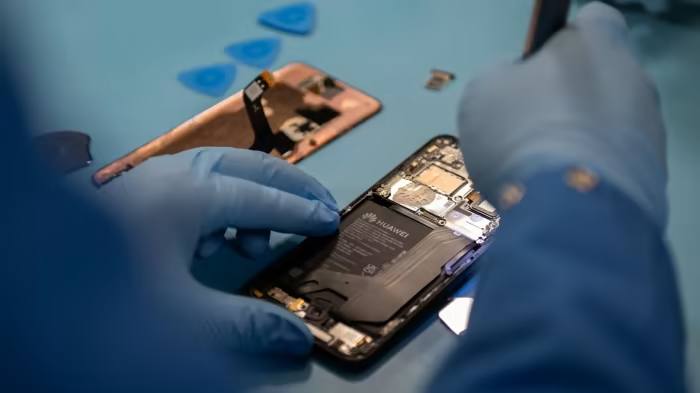Receive free Huawei Technologies updates
We’ll send you a myFT Daily Digest email rounding up the latest Huawei Technologies news every morning.
Good morning. The White House is seeking detailed information on Huawei’s latest flagship smartphone, which analysts have described as an important milestone for the Chinese tech group four years after US restrictions crippled its handset business.
US national security adviser Jake Sullivan said on Tuesday that Washington needed to get “more information” on the precise “character and composition” of a chip powering Huawei’s newly released Mate 60 Pro, in answer to a briefing question on whether US controls on exports of advanced semiconductor technology were being thwarted.
While Huawei has declined to reveal details of its suppliers for the Mate Pro, a dismantling of the phone by the consultancy TechInsights last week suggested it contained a 7-nanometre processor made by Semiconductor Manufacturing International Corp.
The partially state-owned Chinese chipmaker became subject to export restrictions three years ago, when the US commerce department said there was an “unacceptable risk” of chip technology being diverted to it for “military end use”. Read the full story on Huawei’s “Made in China” smartphone — and what it could mean for the US-China tech war.
-
More on chips: US private equity group KKR is planning an initial public offering for a chip equipment maker on Tokyo’s exchange in the fourth quarter, in what would be the market’s biggest IPO since 2018.
Here’s what else I’m keeping tabs on today:
-
EU GDP: Second-quarter growth figures are set to be released today.
-
Tencent: The Chinese tech giant will unveil its artificial intelligence chatbot, joining the global race to dominate generative AI.
-
Australia LNG strike talks: Workers at Chevron’s Western Australian natural gas facilities agreed to pause planned industrial action until Friday, just hours before they were expected to begin strike action amid a dispute over pay and conditions. Chevron’s Gorgon and Wheatstone operations in Australia account for more than 5 per cent of global liquefied natural gas capacity. (Reuters)
Our Long Story Short newsletter provides a selection of the best work across the Financial Times and an insight into reporting life, written by a different female journalist each week. Don’t miss this Friday’s edition from Roula Khalaf, editor of the FT. Sign up now.
Five more top stories
1. WeWork is seeking to renegotiate nearly all of its leases around the world, weeks after the SoftBank-backed office space group warned that there was “substantial doubt” about its ability to continue as a going concern. The company’s drive to cut lease costs threatens a commercial real estate industry that is already suffering from the excess capacity that followed a coronavirus pandemic-driven surge in working from home. Read the full story.
2. Exclusive: Universal Music has struck a deal with French streaming service Deezer to direct more royalties to artists and away from a “sea of noise” that includes amateurs, bots and white-noise soundtracks. The agreement is the biggest shift to the streaming business model since the launch of Spotify in 2008. Here’s how this deal could reshape streaming economics.
3. Turkish president Recep Tayyip Erdoğan has abandoned his life-long hostility to interest rate rises, vowing to use “tight monetary policy” to counter soaring inflation, which the government said would hit 65 per cent by the end of this year. The remarks from Erdoğan, who had previously lashed out at the “interest rate lobby”, are a sign he is backing the more orthodox monetary policy of his new economic team. FT’s Adam Samson reports from Ankara.
4. Officials in China and Japan are pushing back against the strength of the US dollar as a rally by the greenback threatens to drive both the renminbi and the yen to historic lows. The People’s Bank of China set the trading band for the Chinese currency higher than expected on Wednesday while Japan’s top currency diplomat issued his sharpest warning yet against the yen’s fall. Here’s what analysts are saying.
5. Indonesia has threatened to curb TikTok’s shopping platform, months after the Chinese-owned viral video app said it would invest billions of dollars in the fast-growing south-east Asian country. The minister of co-operatives and small and medium enterprises, Teten Masduki, accused TikTok Shop of “monopolistic” business practices, and said Indonesia should follow the lead of other countries including the US and India in limiting the company’s activities.
The Big Read
More than 100 countries are exploring the idea of a central bank digital currency, ranging from China’s “e-yuan” to the UK’s “digital pound”. But as plans for digital cash gain momentum, so have the conspiracy theories. A growing throng of culture warriors have decried CBDCs as a tool designed by global elites and the World Economic Forum to destroy freedom or impose unwelcome environmental and social agendas.
We’re also reading . . .
Chart of the day
Heat records in the 2023 northern hemisphere summer were “not just broken but smashed”, scientists from the EU earth observation agency reported. Read more on the world’s hottest season on record.
Take a break from the news
Our ancestors were on the brink of extinction around 900,000 years ago, according to a new scientific report, with little more than a thousand breeding individuals eking out a lonely existence for more than 100,000 years. But this new theory has been met with scepticism, highlighting the challenge of reconstructing the story of our own species.
Additional contributions from Tee Zhuo and Gordon Smith
Read the full article here

